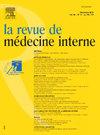Thrombopénie immunologique induite par chimiothérapie : un coupable peut en cacher un autre
IF 0.9
4区 医学
Q3 MEDICINE, GENERAL & INTERNAL
引用次数: 0
Abstract
Introduction
Drug-induced immune thrombocytopenia (DIIT) is a rare cause of immune thrombocytopenia, characterized by the formation of drug-dependent antiplatelet antibodies. DIIT can lead to life-threatening hemorrhage. The diagnosis is difficult, relying on the detection of antiplatelet antibodies in patient's serum exclusively in the presence of the implicated drug. The gold standard test is the monoclonal antibody immobilization of platelet antigens (MAIPA), although other techniques (flow cytometry and Luminex®) can be used.
Patients
We report two cases of DIIT induced by both oxaliplatin and methylprednisolone.
Results
The two patients were undergoing chemotherapy for colon malignancy, receiving a regimen including oxaliplatin following premedication with methylprednisolone. Thrombocytopenia occurred within hours after one infusion (both patients had received prior courses with this regimen). Immunological tests for both patients revealed antiplatelet antibodies in the presence of oxaliplatin (anti-GPIIbIIIa in the first observation, and polytypic in the second one) and methylprednisolone (anti-GPIbV in the first observation and GPIIbIIIa in the second one). After the discontinuation of the implicated drugs (and treatment with prednisone plus intravenous immunoglobulin for the first patient), both patients showed rapid improvement in a few days. Both patients continued chemotherapy without oxaliplatin and methylprednisolone. No relapse was observed during the follow up.
Conclusion
DIIT are a rare cause of secondary immune thrombocytopenia. Diagnosis is complex, and the detection of drug-dependent antiplatelet antibodies in reference laboratories is essential. Oxaliplatin is a classical cause of DIIT. However, associated drugs like methylprednisolone can also be responsible for DIIT.
[药物性免疫性血小板减少症:当奥沙利铂和甲基强的松龙都是罪魁祸首]。
药物性免疫性血小板减少症(DIIT)是一种罕见的免疫性血小板减少症,其特征是形成药物依赖性抗血小板抗体。DIIT可导致危及生命的出血。诊断是困难的,依赖于检测抗血小板抗体在患者的血清中只在涉及的药物存在。金标准测试是血小板抗原的单克隆抗体固定化(MAIPA),尽管其他技术(流式细胞术和Luminex®)也可以使用。患者:我们报告了两例奥沙利铂和甲基强的松龙引起的DIIT。结果:这两名患者正在接受结肠恶性肿瘤化疗,在预用药甲基强的松龙后接受奥沙利铂方案。一次输注后数小时内发生血小板减少(两名患者均接受过该方案的先前疗程)。两名患者的免疫学检查均发现奥沙利铂(第一次观察为抗GPIIbIIIa,第二次观察为多型)和甲基强的松龙(第一次观察为抗gpibv,第二次观察为抗GPIIbIIIa)存在抗血小板抗体。在停用相关药物后(第一个患者使用泼尼松加静脉注射免疫球蛋白治疗),两名患者在几天内均表现出快速改善。两名患者继续化疗,不使用奥沙利铂和甲基强的松龙。随访期间未见复发。结论:DIIT是继发性免疫性血小板减少症的罕见病因。诊断是复杂的,在参考实验室检测药物依赖性抗血小板抗体是必不可少的。奥沙利铂是DIIT的典型病因。然而,甲基强的松龙等相关药物也可能导致DIIT。
本文章由计算机程序翻译,如有差异,请以英文原文为准。
求助全文
约1分钟内获得全文
求助全文
来源期刊

Revue De Medecine Interne
医学-医学:内科
CiteScore
0.70
自引率
11.10%
发文量
526
审稿时长
37 days
期刊介绍:
Official journal of the SNFMI, La revue de medecine interne is indexed in the most prestigious databases. It is the most efficient French language journal available for internal medicine specialists who want to expand their knowledge and skills beyond their own discipline. It is also the main French language international medium for French research works. The journal publishes each month editorials, original articles, review articles, short communications, etc. These articles address the fundamental and innumerable facets of internal medicine, spanning all medical specialties. Manuscripts may be submitted in French or in English.
La revue de medecine interne also includes additional issues publishing the proceedings of the two annual French meetings of internal medicine (June and December), as well as thematic issues.
 求助内容:
求助内容: 应助结果提醒方式:
应助结果提醒方式:


